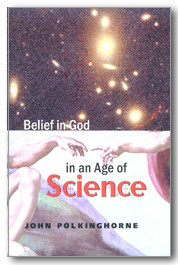New Physics, New Theology
- PATRICK GLYNN
John Polkinghorne's Belief in God in an Age of Science, based on his Terry Lectures at Yale, explores the sweeping consequences of recent revolutions in science for the conflict between skepticism and faith.
 |
The West is entering a new chapter in its intellectual history, and John Polkinghorne is one of a handful of scientists who have already, so to speak, managed to read several pages ahead in the text. Belief in God in an Age of Science is no mere rehash of the tired science-religion controversy. Rather, this short volume, based on the Terry Lectures at Yale, explores the sweeping consequences of recent revolutions in science for the conflict between skepticism and faith. Those familiar with Polkinghorne — an eminent Cambridge University physicist who also happens to be an Anglican priest — will find here a distillation of earlier reflections as well as some new argumentation. The book is worth reading not only for its many insights, but also because it presages a new style of thinking that takes us beyond not only the modern but also the postmodern — a sophisticated, scientifically informed outlook which is nonetheless animated by a firm, rationally supported religious faith.
As a physicist, Polkinghorne understands what many Western thinkers without scientific training have yet to realize: that recent science has shattered the materialistic foundations of the modern secular world view. Modern philosophy from Hobbes onward has taken its bearings from scientific mechanism/materialism, from a vision of the universe as mere "matter and motion." Yet lately physics and cosmology have raced forward, leaving this older outlook behind.
One key feature of the cosmos presented by the new physics is its God-friendliness. Newtonian mechanics ultimately led to the vision of a clockwork universe minus the Clockmaker. But the more scientists have probed cosmic evolution, the more they have realized, in Fred Hoyle's phrase, that the universe is a "put-up job." For human life to emerge, the blind mechanism of natural selection was not enough; on the contrary, the laws of physics had to be programmed minutely from the moment of the big bang. An infinitesimal change in any of the physical constants would have precluded life.
Present-day cosmology therefore leaves us with a choice: either the universe was created by an Intelligent Designer, or it is a massive and incredible coincidence the likes of which we can hardly imagine. Drawing on the philosopher John Leslie, Polkinghorne writes that there are two logical possibilities: "that God is real, and/or there are many and varied universes," the latter being invisible, unsubstantiated, and probably undetectable in principle. Polkinghorne does not belabor the point. While the God hypothesis is not "logically coercive," as he puts it, it easily stands up against the alternative.
Yet Polkinghorne's interest is not in proving God's existence but rather in showing how theology can "lay claim" to an "intellectually satisfying understanding," crucially supplementing science. He also seeks to show how theology and science, in dialogue, can inform and correct each other.
His target, in a sense, is the standard modern formulation of the science-religion relationship, which ceded to science the entire sphere of objective truth and — especially since Friedrich Schleiermacher — consigned theology increasingly to subjectivism and empty speculation. When it comes to science, Polkinghorne opposes naive positivism. When it comes to theology, he insists on a greater concern for objective truth.
Science, Polkinghorne emphasizes, is not a value-free but rather a "value-laden" activity. Considerations such as the "beauty" and "elegance" of theory are "fundamental" to physics; scientific discourse depends on moral virtues such as "honesty" and "generosity of intellectual sharing."
But he resists any notion that reality is "socially constructed." Likewise, he reproves some theology for unconcern with simple truth in the literal sense of that term. He advocates what he calls "critical realism" and "bottom-up" theology, favoring quite orthodox and literal interpretations of key Christian mysteries, including the incarnation, redemption, and even (as he made clear in The Faith of a Physicist) the virgin birth.
Can the new physics beget a new theology? Polkinghorne offers a fascinating gloss on the question of free will and divine providence, noting that present-day physics — via quantum and chaos theories — has swept aside the old principle of determinism. His most eloquent observations concern what the laws of nature say about the problem of evil, suggesting that a divine "letting-be" is needed to underwrite human freedom.
It is in the nature of dense snow fields that they will sometimes slip with the destructive force of an avalanche. It is in the nature of lions that they will seek their prey....it is in the nature of humankind that sometimes people will act with selfless generosity but sometimes with murderous selfishness. That these things are so is not gratuitous or due to divine oversight or indifference. They are the necessary cost of a creation given by its Creator the freedom to be itself.
Theologians and scientists alike will find food for thought here, and philosophers should take heed — for John Polkinghorne's intermarriage of scientific and theological insight may well presage a new "post-secular" stage in Western thought.
 This is J. Fraser Field, Founder of CERC. I hope you appreciated this piece. We curate these articles especially for believers like you.
This is J. Fraser Field, Founder of CERC. I hope you appreciated this piece. We curate these articles especially for believers like you.
Please show your appreciation by making a $3 donation. CERC is entirely reader supported.

Acknowledgement
Glynn, Patrick "New Physics, New Theology." National Review (April 6, 1998): 55-56.
Reprinted with permission of the National Review. To subscribe to the National Review write P.O. Box 668, Mount Morris, Ill 61054-0668 or phone 815-734-1232.
The Author
Patrick Glynn, associate director of the George Washington University Institute for Communitarian Policy Studies, is the author of God: The Evidence.
Copyright © 1998 National Review

